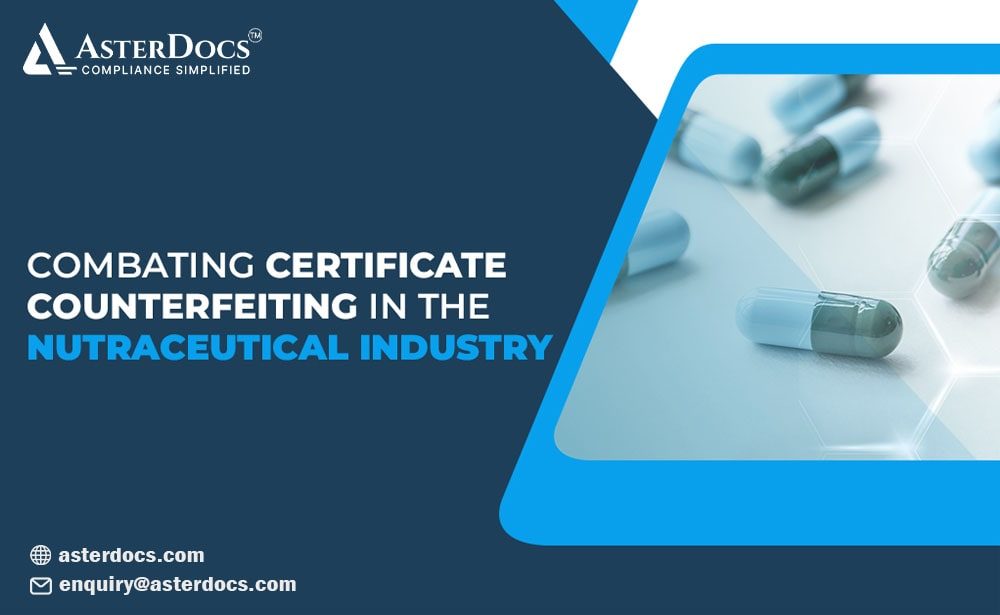In the nutraceutical industry, maintaining integrity and ensuring product quality and safety are paramount. However, the rising issue of certificate counterfeiting poses a significant threat to the industry’s reputation and consumer trust.
Certificate counterfeiting involves the production and distribution of fake certificates that falsely claim compliance with regulations, quality standards, and authenticity. In this blog, we will delve into the challenges posed by certificate counterfeiting, its impact on the nutraceutical industry, and explore strategies to safeguard integrity and combat this growing problem.
#1 Understanding Certificate Counterfeiting:
Certificate counterfeiting refers to the production and distribution of fraudulent certificates that falsely claim compliance with regulations, quality standards, and authenticity in the nutraceutical industry.
- The implications of certificate counterfeiting are significant, posing risks to product quality, safety, and regulatory compliance.
- Counterfeit certificates can deceive consumers, regulatory bodies, and industry stakeholders, leading to potential health hazards, financial losses, and erosion of trust in the nutraceutical industry.
#2 The Risks and Consequences:
Counterfeit certificates pose substantial risks to the nutraceutical industry and its consumers.
- Compromised product quality can lead to ineffective or unsafe products, endangering consumer health and well-being.
- Safety concerns arise as counterfeiters may use unauthorized ingredients or engage in improper manufacturing practices.
- Moreover, the use of counterfeit certificates can result in regulatory non-compliance, leading to legal consequences, penalties, and potential product recalls.
- Additionally, the damage to brand reputation can be severe, eroding consumer trust and loyalty, resulting in reduced sales and negative impact on the overall market.
#3 Identifying Counterfeit Certificates:
Identifying counterfeit certificates requires vigilance and attention to detail.
- Key indicators of counterfeit certificates may include inconsistencies in design, misspelled words, altered logos or holograms, or incorrect information.
- Red flags to look out for include suspiciously low prices, uncertified products, and unverified suppliers.
- Verifying the authenticity of certificates is crucial and involves thorough examination and validation processes.
- Cross-referencing with authoritative databases, contacting certification bodies, and conducting independent verification are essential steps to ensure the legitimacy of certificates.
#4 The Impact on Consumer Trust:
Consumer trust is of utmost importance in the nutraceutical industry. Certificate counterfeiting undermines this trust, as consumers may unknowingly purchase products based on fraudulent claims.
- Diminished consumer confidence can lead to skepticism towards the entire industry, affecting purchasing decisions, brand loyalty, and overall market growth.
- Restoring and maintaining consumer trust requires concerted efforts to combat counterfeit certificates and ensure transparency and authenticity in the nutraceutical supply chain.
#5 Tips to Combat Certificate Counterfeiting
The fight against certificate counterfeiting requires ongoing vigilance and adaptation to evolving counterfeiting techniques.
- Continuous improvement and innovation in anti-counterfeiting technologies, such as tamper-evident packaging, track-and-trace systems, and secure labeling, are vital.
- Collaborative efforts among stakeholders should be sustained, with regular information sharing and updates on emerging counterfeiting trends.
- Regulatory support is essential to strengthen enforcement and establish stricter penalties for counterfeiters.
- By remaining proactive, embracing technological advancements, and maintaining a united front, the nutraceutical industry can mitigate the risks of certificate counterfeiting and ensure the integrity of its products and the trust of consumers.
The Bottom line
Certificate counterfeiting poses a significant challenge to the nutraceutical industry’s integrity and the well-being of consumers. Safeguarding against counterfeit certificates requires a multi-faceted approach, including regulatory measures, industry collaboration, and consumer awareness.
By taking proactive steps to combat certificate counterfeiting, the nutraceutical industry can protect its reputation, ensure product quality, and maintain consumer trust. Together, stakeholders can work towards a future where counterfeit certificates hold no place in the nutraceutical industry, fostering a safer and more reliable market for consumers.













